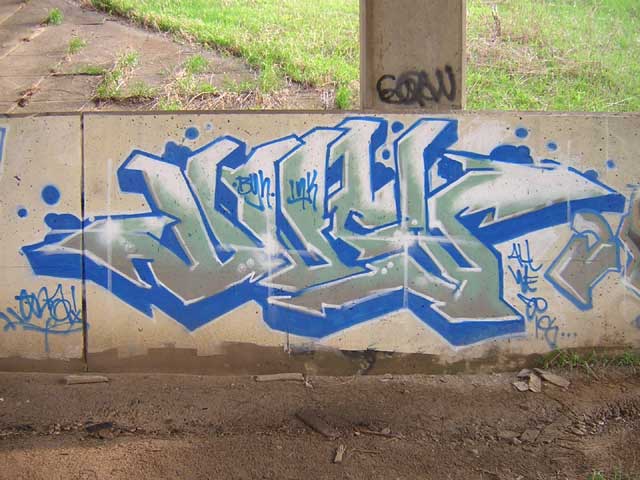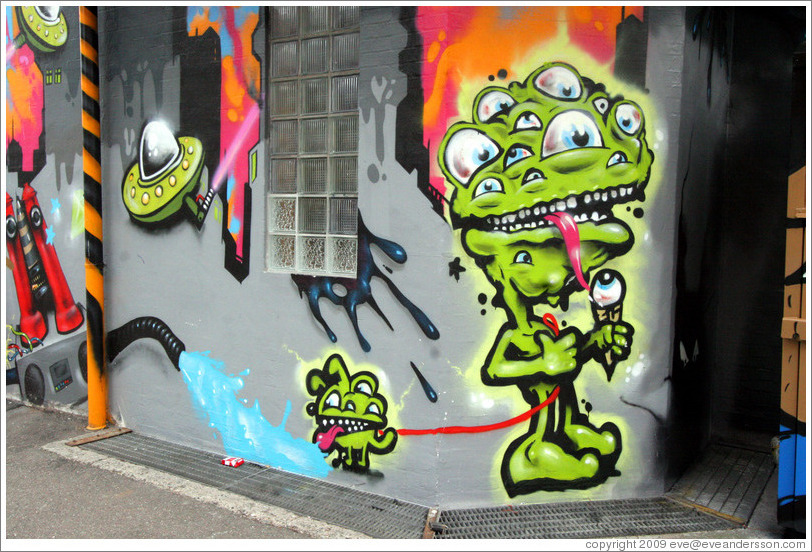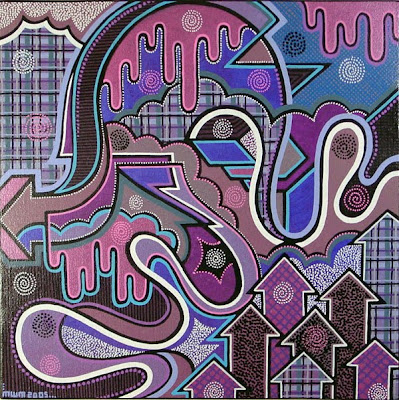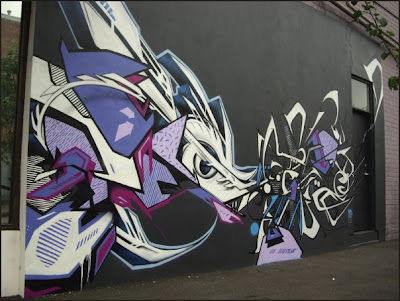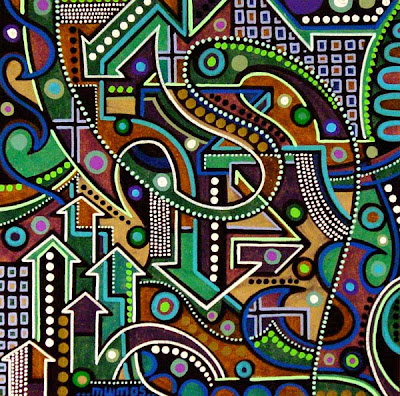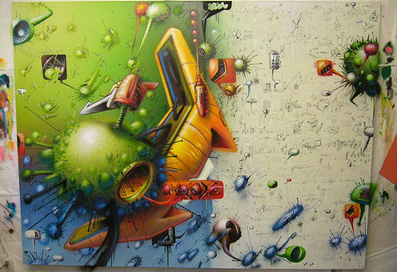Graffiti Alphabet Tutorial
|
|
|---|
|
|
|---|
Saturday, October 31, 2009
Action vandalism with graffiti

Many cities beefing laws to fight against graffiti. In San Francisco, California, for example, current owner has 30 days to clean up graffiti on their property or face paying the city to do for them. Inevitably, the question will arise when the graffiti art?
Some famous graffiti taggers have been accepted by the art world. The most famous is Keith Haring, whose work has sold upward of $ 100,000. Recently, taggers of "neck face" began to sell their works in an art gallery, and has appeared in newspapers and on television, often with masks covering their faces.
In San Francisco, where the floor is known for being soft on graffiti and the property owner rather than law enforcement agencies to bear the burden of reducing graffiti, Mayor Gavin Newsom recently proposed a pilot program that will d art artist paint boxes for their artistic value. To learn more about this art projects in San Francisco.
According to the San Francisco Examiner, "police officer Christopher Putz, who work solely on graffiti, argued that putting public art on the box is owned by SBC Communications and the Department of Parking and traffic could lead to bureaucratic mess where nobody is responsible for vandalism.
While the owners are legally obliged by law to clean city vandalism, under state law, the work of an artist can not touch without permission. Invevitably, questions about art, vandalism and property rights must be discussed in more detail.
To give an idea of how graffiti has become a graffiti production, from today, sharing sites Flickr photos tagged containing 350,000 images.
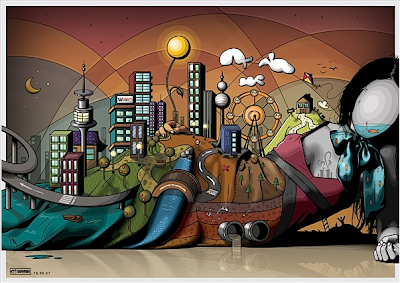
Digital Graffiti Alphabet
 Graffiti alphabet letters 3 colors on the digital model is very adequate, because if too many colors that seemed to appear chaotic.
Graffiti alphabet letters 3 colors on the digital model is very adequate, because if too many colors that seemed to appear chaotic.China Graffiti Alphabet
 graffiti alphabet letters writing is very much variatif and there are also visible at a glance, that graffiti is any posts such as china, akn but a short distance from china not any posts, just a model written style china.
graffiti alphabet letters writing is very much variatif and there are also visible at a glance, that graffiti is any posts such as china, akn but a short distance from china not any posts, just a model written style china.Friday, October 30, 2009
Graffiti Alphabet "A-Z"
 writing a letter to the z, would be very interesting for the children when we make a model graffiti alphabet, graffiti art, and looks interesting. Please try .....
writing a letter to the z, would be very interesting for the children when we make a model graffiti alphabet, graffiti art, and looks interesting. Please try .....Thursday, October 29, 2009
The spread of the culture of graffiti
In 1979, graffiti artist Lee Quinones and Fab 5 Freddy were opening an art gallery in Rome by agents Claudio Bruni. To many outside of New York was their first encounter with this art form. Fab 5 Freddy friendship with Debbie Harry Blondie influenced single "Rapture" (Chrysalis, 1981), a video featuring Jean-Michel Basquiat SAMO © Graffiti, and offer many their first look at the picture elements of culture hip-hop graffiti. More important here, Charlie Ahearn's independently released fiction film Wild Style (Wild Style, 1982), and early PBS documentary Style Wars (1983). Hit songs like "The Message" and "Planet Rock" and music videos that accompany them (both 1982) contributed to a growing interest outside New York in all aspects of hip hop.Style war represented not only a graffiti artist called Skeme, Dondi, and Zephyr Minon, but also strengthened the role of graffiti appeared in the New York hip, hop culture is famous for combining the early break dance groups like Rock Steady Crew in the film which also includes a rap soundtrack only. Style Wars is still recognized as representing the most productive of the film is set in the hip-hop youth culture 1980s.Fab Initial 5 Freddy and Futura 2000 took hip-hop graffiti in Paris and London in New York City Rap Tour in 1983. Hollywood is also interesting to observe in such writers as Phase 2, describing the culture and give it international exposure in movies like "Beat Street (Orion, 1984).
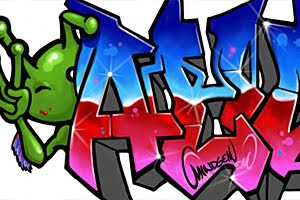 This period also saw the emergence of new type stencil graffiti. Some early examples were created around 1981 by the tin in rats graffiti in Paris in 1985 stencil has appeared in other cities like New York, Sydney and Melbourne, where they were documented by American and Australian photographer photographer Charles Gatewood Rennie Ellis.
This period also saw the emergence of new type stencil graffiti. Some early examples were created around 1981 by the tin in rats graffiti in Paris in 1985 stencil has appeared in other cities like New York, Sydney and Melbourne, where they were documented by American and Australian photographer photographer Charles Gatewood Rennie Ellis.
 This period also saw the emergence of new type stencil graffiti. Some early examples were created around 1981 by the tin in rats graffiti in Paris in 1985 stencil has appeared in other cities like New York, Sydney and Melbourne, where they were documented by American and Australian photographer photographer Charles Gatewood Rennie Ellis.
This period also saw the emergence of new type stencil graffiti. Some early examples were created around 1981 by the tin in rats graffiti in Paris in 1985 stencil has appeared in other cities like New York, Sydney and Melbourne, where they were documented by American and Australian photographer photographer Charles Gatewood Rennie Ellis.Graffiti writing and culture
In the mid 1970s, the time, most standards were set in writing the graffiti and the culture. Heaviest "bombardment" of the history of the United States occurred during this period, partly because of economic constraints in New York, limiting his ability to fight against this form of art with programs of 'graffiti removal or maintenance of transit. Also at this time, "top-to-bottom" has evolved to take the entire subway cars. Most worthy of note this step is the formation of "throw-ups, which is more complex than simple" tagging, "but has not developed as" sides. "Shortly after their introduction, throw - ups lead to races to see who can do the most throw-ups in the least.
 Graffiti writing became very competitive and artists trying to go "all cities", or had their names in the five boroughs of New York. Finally, the standards set in the early 70s began to become stagnant. This change attitude led many artists in the 1980s with a desire to expand and change.
Graffiti writing became very competitive and artists trying to go "all cities", or had their names in the five boroughs of New York. Finally, the standards set in the early 70s began to become stagnant. This change attitude led many artists in the 1980s with a desire to expand and change.
Modern graffiti on trains
 The late 1970s and early 1980s brought a new wave of creativity to the scene. As the influence of graffiti was born in the Bronx, a graffiti movement began with the friendly encouragement Freddie. Fab 5 Freddy (Fred Brathwaite) is one of the graffiti popular personalities of the time, which began in Brooklyn "Wall-writing group." He noted how differences in spraying techniques and letters between Upper Manhattan and Brooklyn joined in the late 70s: "out of" Wild Style. "[26] Fab 5 Freddy is often credited d 'help spread the influence of graffiti and rap off the top foundations in the Bronx, and create links that most of the art center and white music scene. It was about this time that the world of art began to become established receptive to the graffiti culture for the first time since Hugo Martinez Razor Gallery in the 1970s.
The late 1970s and early 1980s brought a new wave of creativity to the scene. As the influence of graffiti was born in the Bronx, a graffiti movement began with the friendly encouragement Freddie. Fab 5 Freddy (Fred Brathwaite) is one of the graffiti popular personalities of the time, which began in Brooklyn "Wall-writing group." He noted how differences in spraying techniques and letters between Upper Manhattan and Brooklyn joined in the late 70s: "out of" Wild Style. "[26] Fab 5 Freddy is often credited d 'help spread the influence of graffiti and rap off the top foundations in the Bronx, and create links that most of the art center and white music scene. It was about this time that the world of art began to become established receptive to the graffiti culture for the first time since Hugo Martinez Razor Gallery in the 1970s.
 It also, however, the last wave of true bombing before the Transit Authority made graffiti eradication a priority. MTA (Metro Transit Authority) began to repair the garden fence, and removing graffiti consistent, struggling against a wave of graffiti artists. With the MTA combating cons artists remove their work often allows many artists to quit because of frustration, because they work constantly eliminated.
It also, however, the last wave of true bombing before the Transit Authority made graffiti eradication a priority. MTA (Metro Transit Authority) began to repair the garden fence, and removing graffiti consistent, struggling against a wave of graffiti artists. With the MTA combating cons artists remove their work often allows many artists to quit because of frustration, because they work constantly eliminated.
 Graffiti writing became very competitive and artists trying to go "all cities", or had their names in the five boroughs of New York. Finally, the standards set in the early 70s began to become stagnant. This change attitude led many artists in the 1980s with a desire to expand and change.
Graffiti writing became very competitive and artists trying to go "all cities", or had their names in the five boroughs of New York. Finally, the standards set in the early 70s began to become stagnant. This change attitude led many artists in the 1980s with a desire to expand and change.Modern graffiti on trains
 The late 1970s and early 1980s brought a new wave of creativity to the scene. As the influence of graffiti was born in the Bronx, a graffiti movement began with the friendly encouragement Freddie. Fab 5 Freddy (Fred Brathwaite) is one of the graffiti popular personalities of the time, which began in Brooklyn "Wall-writing group." He noted how differences in spraying techniques and letters between Upper Manhattan and Brooklyn joined in the late 70s: "out of" Wild Style. "[26] Fab 5 Freddy is often credited d 'help spread the influence of graffiti and rap off the top foundations in the Bronx, and create links that most of the art center and white music scene. It was about this time that the world of art began to become established receptive to the graffiti culture for the first time since Hugo Martinez Razor Gallery in the 1970s.
The late 1970s and early 1980s brought a new wave of creativity to the scene. As the influence of graffiti was born in the Bronx, a graffiti movement began with the friendly encouragement Freddie. Fab 5 Freddy (Fred Brathwaite) is one of the graffiti popular personalities of the time, which began in Brooklyn "Wall-writing group." He noted how differences in spraying techniques and letters between Upper Manhattan and Brooklyn joined in the late 70s: "out of" Wild Style. "[26] Fab 5 Freddy is often credited d 'help spread the influence of graffiti and rap off the top foundations in the Bronx, and create links that most of the art center and white music scene. It was about this time that the world of art began to become established receptive to the graffiti culture for the first time since Hugo Martinez Razor Gallery in the 1970s. It also, however, the last wave of true bombing before the Transit Authority made graffiti eradication a priority. MTA (Metro Transit Authority) began to repair the garden fence, and removing graffiti consistent, struggling against a wave of graffiti artists. With the MTA combating cons artists remove their work often allows many artists to quit because of frustration, because they work constantly eliminated.
It also, however, the last wave of true bombing before the Transit Authority made graffiti eradication a priority. MTA (Metro Transit Authority) began to repair the garden fence, and removing graffiti consistent, struggling against a wave of graffiti artists. With the MTA combating cons artists remove their work often allows many artists to quit because of frustration, because they work constantly eliminated.Graffiti movement seen in the contemporary world
Early modernist graffiti dates back to the box to the car in the early 1920s but the movement of graffiti seen in the contemporary world today actually crossed the minds of political activists and members of the gang in the 1960s. The pioneering era "of graffiti occurred in the years 1969 to 1974. This period is a period of change in popularity and style. New York City became the new hub (official Philadelphia, Pennsylvania) tags and graffiti images. Graffiti artists during this period tried to put as many signs around the city. This is the end of exposure. Immediately after the migration from Philadelphia to New York City produced one of the graffiti artists first to attract media attention in New York, Taki 183. Taki 183 was a young man from Washington Heights, Manhattan who worked as a messenger on foot. His tag is a mixture of his name Demetrius (Demetrakis), Taki and the street number, 183. Being a foot messenger, he was constantly on the subway and began to put his tag-along trips. Gave birth in 1971 was an article in The New York Times titled " 'Taki 183 'grow Pen Pal. Julio 204 is also credited as a writer too early, but not recognized at the time outside of the graffiti subculture. The names of other famous then are: Stay High 149, PHASE 2, Stitch 1, Joe 182, Junior 161 and Cay 161. Barbara 62 and Eva 62 is also important early graffiti artists in New York and is the first woman to be famous for writing graffiti.
 Also held during this period was the movement from outside the city on the street to the subway. Graffiti also saw the first seeds of competition at that time. The goal of most artists today is to "wake up" several tags and bombs in as many places as possible. Artists began to move in the subway train yards away as they could with a lower risk, often to create complex works of art along the subway car. This occurs when the action, the bombing was officially established.
Also held during this period was the movement from outside the city on the street to the subway. Graffiti also saw the first seeds of competition at that time. The goal of most artists today is to "wake up" several tags and bombs in as many places as possible. Artists began to move in the subway train yards away as they could with a lower risk, often to create complex works of art along the subway car. This occurs when the action, the bombing was officially established.
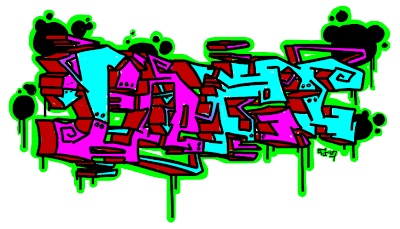 By 1971 tags began to take their side of the calligraphic signature because, due to a large number of artists, each of the graffiti artist needed a way to differentiate themselves. Besides the growing complexity and creativity, tags also began to grow in size and scale - for example, many artists have begun to increase the font size and line width, and put their tags . This has given rise to so-called "work" and "parts" of 1972. Super Kool 223 is credited as being the first to make these parts.
By 1971 tags began to take their side of the calligraphic signature because, due to a large number of artists, each of the graffiti artist needed a way to differentiate themselves. Besides the growing complexity and creativity, tags also began to grow in size and scale - for example, many artists have begun to increase the font size and line width, and put their tags . This has given rise to so-called "work" and "parts" of 1972. Super Kool 223 is credited as being the first to make these parts.
 The use of drops of these drawings or hatching, and auditors increasingly popular. Using spray paint has increased dramatically during this period that artists began to expand their work. "Top-to-bottom", works that reach all the car up, making their first appearance at this time. The overall creativity and artistic maturation of this time has not gone unnoticed by the mainstream - Hugo Martinez founded the United Graffiti Artists (UGA) in 1972. UGA consists of many graffiti artists of the time, and aims to present graffiti in an art gallery. In 1974, graffiti artists have begun to combine the use of scenery and cartoon characters in their work. TF5 (The Fabulous Five), is a crew known complex designed for the entire car.
The use of drops of these drawings or hatching, and auditors increasingly popular. Using spray paint has increased dramatically during this period that artists began to expand their work. "Top-to-bottom", works that reach all the car up, making their first appearance at this time. The overall creativity and artistic maturation of this time has not gone unnoticed by the mainstream - Hugo Martinez founded the United Graffiti Artists (UGA) in 1972. UGA consists of many graffiti artists of the time, and aims to present graffiti in an art gallery. In 1974, graffiti artists have begun to combine the use of scenery and cartoon characters in their work. TF5 (The Fabulous Five), is a crew known complex designed for the entire car.
 Also held during this period was the movement from outside the city on the street to the subway. Graffiti also saw the first seeds of competition at that time. The goal of most artists today is to "wake up" several tags and bombs in as many places as possible. Artists began to move in the subway train yards away as they could with a lower risk, often to create complex works of art along the subway car. This occurs when the action, the bombing was officially established.
Also held during this period was the movement from outside the city on the street to the subway. Graffiti also saw the first seeds of competition at that time. The goal of most artists today is to "wake up" several tags and bombs in as many places as possible. Artists began to move in the subway train yards away as they could with a lower risk, often to create complex works of art along the subway car. This occurs when the action, the bombing was officially established. By 1971 tags began to take their side of the calligraphic signature because, due to a large number of artists, each of the graffiti artist needed a way to differentiate themselves. Besides the growing complexity and creativity, tags also began to grow in size and scale - for example, many artists have begun to increase the font size and line width, and put their tags . This has given rise to so-called "work" and "parts" of 1972. Super Kool 223 is credited as being the first to make these parts.
By 1971 tags began to take their side of the calligraphic signature because, due to a large number of artists, each of the graffiti artist needed a way to differentiate themselves. Besides the growing complexity and creativity, tags also began to grow in size and scale - for example, many artists have begun to increase the font size and line width, and put their tags . This has given rise to so-called "work" and "parts" of 1972. Super Kool 223 is credited as being the first to make these parts. The use of drops of these drawings or hatching, and auditors increasingly popular. Using spray paint has increased dramatically during this period that artists began to expand their work. "Top-to-bottom", works that reach all the car up, making their first appearance at this time. The overall creativity and artistic maturation of this time has not gone unnoticed by the mainstream - Hugo Martinez founded the United Graffiti Artists (UGA) in 1972. UGA consists of many graffiti artists of the time, and aims to present graffiti in an art gallery. In 1974, graffiti artists have begun to combine the use of scenery and cartoon characters in their work. TF5 (The Fabulous Five), is a crew known complex designed for the entire car.
The use of drops of these drawings or hatching, and auditors increasingly popular. Using spray paint has increased dramatically during this period that artists began to expand their work. "Top-to-bottom", works that reach all the car up, making their first appearance at this time. The overall creativity and artistic maturation of this time has not gone unnoticed by the mainstream - Hugo Martinez founded the United Graffiti Artists (UGA) in 1972. UGA consists of many graffiti artists of the time, and aims to present graffiti in an art gallery. In 1974, graffiti artists have begun to combine the use of scenery and cartoon characters in their work. TF5 (The Fabulous Five), is a crew known complex designed for the entire car.Graffiti as an element of hip hop
In America around the late 1960s, graffiti was used as a form of expression by political activists, and also by gangs like the Savage Skulls, La Familia, and Savage Nomads to mark territory. In the late 1960s, signs of graffiti writers tag corn bread Philadelphia, Cool Earl and Topcat 126 began to appear. Cornbread is often cited as one of the first authors of modern graffiti. Around 1970-71, innovation center Graffiti moved to New York City in which the author followed Taki 183 and Tracy 168 would add their street number, their nickname of "bomb" a train with their work, and let now take the subway and reputation, that is impressive, or simply pervasive, enough "All City". Bubble letters originally held the power of writers from the Bronx, although complex 168 Tracy wrote called "Wild Style" will come to define art. Trendsetters Early joined in the 70s by artists like Dondi, Zephyr and Lady Pink.
 Graffiti is one of four main elements of hip-hop culture (with a sudden, DJing, and breakdancing). The relationship between graffiti and hip-hop culture emerged in the early graffiti artists practicing other aspects of hip-hop, and practiced in the region - areas where other elements of hip-hop has evolved as a form Art. In the mid-eighties, the form will move from the street art world. Jean-Michel Basquiat left SAMO tag for its art galleries, street art and even connect to hip-hop would loosen. Occasional hip hop paeans to graffiti is still heard throughout the nineties, however, on tracks like "Wrong Side of Da Tracks artifacts" and Company Flow Lune TNS ".
Graffiti is one of four main elements of hip-hop culture (with a sudden, DJing, and breakdancing). The relationship between graffiti and hip-hop culture emerged in the early graffiti artists practicing other aspects of hip-hop, and practiced in the region - areas where other elements of hip-hop has evolved as a form Art. In the mid-eighties, the form will move from the street art world. Jean-Michel Basquiat left SAMO tag for its art galleries, street art and even connect to hip-hop would loosen. Occasional hip hop paeans to graffiti is still heard throughout the nineties, however, on tracks like "Wrong Side of Da Tracks artifacts" and Company Flow Lune TNS ".
 Graffiti is one of four main elements of hip-hop culture (with a sudden, DJing, and breakdancing). The relationship between graffiti and hip-hop culture emerged in the early graffiti artists practicing other aspects of hip-hop, and practiced in the region - areas where other elements of hip-hop has evolved as a form Art. In the mid-eighties, the form will move from the street art world. Jean-Michel Basquiat left SAMO tag for its art galleries, street art and even connect to hip-hop would loosen. Occasional hip hop paeans to graffiti is still heard throughout the nineties, however, on tracks like "Wrong Side of Da Tracks artifacts" and Company Flow Lune TNS ".
Graffiti is one of four main elements of hip-hop culture (with a sudden, DJing, and breakdancing). The relationship between graffiti and hip-hop culture emerged in the early graffiti artists practicing other aspects of hip-hop, and practiced in the region - areas where other elements of hip-hop has evolved as a form Art. In the mid-eighties, the form will move from the street art world. Jean-Michel Basquiat left SAMO tag for its art galleries, street art and even connect to hip-hop would loosen. Occasional hip hop paeans to graffiti is still heard throughout the nineties, however, on tracks like "Wrong Side of Da Tracks artifacts" and Company Flow Lune TNS ".What is graffiti?
GRAFFITI ART IS HORRENDOUS
 Graffiti (singular: Grafiti, plural is used as an object mass of words) is the name of the preview letter or scratched, written, painted or marked in any way PROPERTY updated. Graffiti is any type of public signs that the writing may appear simple words to describe Mural. Graffiti has existed since the time of FIRST, ex. former. dating back to ancient Greece and the Roman Empire. In modern times, spray paint, and cats have become standard markers fence materials commonly used. In most countries, with graffiti strewn REMOVE THE PROPERTY OWNERS consent is considered vandalism, punishable by law. Sometimes graffiti is used to communicate social messages and policies. For some people, it is an art form worthy of display and gallery exhibitions for other ITU is vandalism. Graffiti has evolved into a Land Down presence pop culture often associated with music and hip hop the b-Boying create the lifestyle that is still general hidden.Graffiti company serves as a signal to mark the area of gangs or use of indicator or "tag" for gang activity. The controversy surrounding graffiti Create the persistent disagreement between the Acting City / graffiti and repression which seek to expose their works to the public place. There are many different types and styles of graffiti and rapidly growing value Art form highly contested, vilified by the authorities while also subject to many days of protection, sometimes within the same jurisdiction.
Graffiti (singular: Grafiti, plural is used as an object mass of words) is the name of the preview letter or scratched, written, painted or marked in any way PROPERTY updated. Graffiti is any type of public signs that the writing may appear simple words to describe Mural. Graffiti has existed since the time of FIRST, ex. former. dating back to ancient Greece and the Roman Empire. In modern times, spray paint, and cats have become standard markers fence materials commonly used. In most countries, with graffiti strewn REMOVE THE PROPERTY OWNERS consent is considered vandalism, punishable by law. Sometimes graffiti is used to communicate social messages and policies. For some people, it is an art form worthy of display and gallery exhibitions for other ITU is vandalism. Graffiti has evolved into a Land Down presence pop culture often associated with music and hip hop the b-Boying create the lifestyle that is still general hidden.Graffiti company serves as a signal to mark the area of gangs or use of indicator or "tag" for gang activity. The controversy surrounding graffiti Create the persistent disagreement between the Acting City / graffiti and repression which seek to expose their works to the public place. There are many different types and styles of graffiti and rapidly growing value Art form highly contested, vilified by the authorities while also subject to many days of protection, sometimes within the same jurisdiction.Art Graffiti Alphabet
 we may try to make a graffiti alphabet with a color display can also be used as the basis of art so beautiful, as in the picture above.
we may try to make a graffiti alphabet with a color display can also be used as the basis of art so beautiful, as in the picture above.Graffiti Alphabet Brushes
 coloring with the water brush model, the graffiti alphabet will appear more bright and clear as the original color than the regular model.
coloring with the water brush model, the graffiti alphabet will appear more bright and clear as the original color than the regular model.Wednesday, October 28, 2009
Subscribe to:
Comments (Atom)





